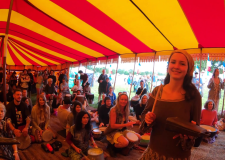Brighton and Hove free school attracts hundreds of applications before it even opens
The number of young children in Brighton and Hove is growing. It could soon outstrip the number of primary schools places available.
So you’d think that when a group of parents volunteered to set up a new school from scratch that everyone would be pleased.
But you’d be wrong. Plans for the Brighton and Hove Bilingual Primary School have been greeted with a mixture of praise and trepidation.
The idea of a bilingual primary school has certainly proved attractive to parents. More than 800 contacted the school to inquire about places.
What’s astonishing about that is that it doesn’t yet even have a classroom to its name let alone a head teacher or any staff.
A steering group is working overtime to resolve these issues as the school – the first state-funded bilingual primary school in England – plans to open in September.
It was one of 55 approved in principle by Education Secretary Michael Gove in October – and was the first of only five that he mentioned by name.
One of the others that he named was the sixth form free school being set up by Brighton College in London to teach children from disadvantaged areas.
 Marina Gutierrez, from Hollingbury, chairs the steering group that is setting up the Brighton and Hove Bilingual Primary School which will teach children in English and Spanish.
Marina Gutierrez, from Hollingbury, chairs the steering group that is setting up the Brighton and Hove Bilingual Primary School which will teach children in English and Spanish.
The 43-year-old mother of two is bilingual herself although she grew up speaking English and Italian.
She said: “I have an Italian father and an English mother. I was born in Brighton and lived in Italy for eight years from the age of one.
“I did A level French. I always found languages very easy. Then I took a gap year in Mexico and I picked up Spanish.”
Marina also picked up a Mexican husband and on returning to Britain she taught Spanish to adults.
But since 2007 she has been a registered childminder. She said: “This (setting up the free school) has taken over at the moment so I don’t have the time to continue childminding.
“I’ve had two inspections – both outstanding – and Ofsted want to feature me on their website as an example of exemplary practice around balanced bilingualism – ensuring that biculturalism is also achieved when teaching children to be bilingual.
“The children are only exposed to Spanish. I never spoke to them in English at all.”
When the policy of allowing parents, charities and others to set up free schools was first announced, she was excited by the possibilities.
She said: “My ambition was to see free bilingual education in England. When I put an email out, everyone was very positive so I registered with the New Schools Network – a charity that helps people who are trying to start up free schools.”
After an initial meeting at Fiveways, Marina, a former Dorothy Stringer pupil, said: “We formed a steering group, worked out our aims and split the work up and looked for people with relevant expertise and experience.”
So the steering group includes, for example, someone with a finance background to work through the numbers, someone with the relevant writing skills to draft proposals and tackle the inevitable form-filling and someone else with educational experience in the bilingual field.
They went to the Department for Education in London to hand in their proposal last year and four months later they were given the green light. But there is still a long way to go before the school can open on time in September.
Identifying and securing a site with suitable premises is one of the two big tasks on the to do list. The other is recruiting a head teacher – a process that is well under way.
Perhaps not surprisingly with such a new concept, there have been misconceptions.
Marina said: “A lot of people think it’s a school for the Spanish community. It’s not. It’s for all the children of Brighton and Hove.
“Every single child who wishes to attend the school has the opportunity because our catchment area is the whole of Brighton and Hove.
“Some children may come without any English or Spanish. Some may come speaking three or four languages.
“It will be following the national curriculum with teachers who are fully qualified outstanding practitioners.
“We’re in the process of recruiting a head teacher – an innovative and outstanding leader.”
She said that the aim was to have a school for 420 pupils aged 4 to 11 in two classes a year.
To start with, though, the school will have two Reception year classes and two Year 1 classes, with 30 children in a class, making 120 children in total.
 Parents can apply for places until Monday 16 April – about three months after Brighton and Hove City Council’s own deadline. Application forms can be found at www.bilingualprimaryschool.org.uk.
Parents can apply for places until Monday 16 April – about three months after Brighton and Hove City Council’s own deadline. Application forms can be found at www.bilingualprimaryschool.org.uk.
Marina said: “We wanted to co-ordinate admissions with the council but we weren’t able to do so.
“Our offers will be sent out on the same day as the local authority – 30 April.
“This year uniquely parents will receive two letters – one from us and another from the local authority.
“In case anything happens we’ve told all parents to apply for a place at a local authority school.”
While hundreds initially asked about places, Marina said that the final number of applicants was likely to be much lower now that the school would open for Reception and Year 1 children only.
She said that the school would grow organically with a new intake of Reception pupils each September.
And the steering group and its supporters were busy raising funds for transport as they still had not sealed the deal on a site.
They could be bringing children from all corners of Brighton and Hove to the location.
And although they have somewhere in mind, Marina was reluctant to say where until a deal is done.
One of her colleagues, Natalie Woodman-Cole, who lives in Westdene, spoke about the enthusiasm surrounding the project and her reasons for supporting it.
They include the way that it will improve job prospects for local children as the leave school to work in an increasingly globalised economy.
She pointed to Amex bringing its European HQ in Brighton and the possibilities there.
The 38-year-old mother of five worked as a nurse before becoming a science teacher, specialising in biology, at Cardinal Newman Catholic School.
She also teaches health and social care to A level and diploma students and GCSE child development.
She works part-time at the school, with the rest of the time spent on the Bilingual Primary School.
Natalie said that she went to school in Brighton and had “a deep understanding of the diverse, rich community here”.
Unlike Marina, she is not bilingual but said that the school was attracting interest from people with several languages to people who spoke just one.
She said: “I only speak schoolgirl French although I’m really passionate about language learning.
“All my closest friends can speak another language and I’ve often felt at a disadvantage.
“I have both a personal and a professional interest in the project and was fully committed to it from the moment I heard about it. It has been an amazing journey to get this far.
“I desperately want my children to have the advantage of learning another language.”
Her two youngest are aged 5 and 4. If the school opens on time, they will have the chance.
What is a free school?
According to the Department for Education, free schools are non-profit making, independent, state-funded schools.
In theory, almost anyone can set one up, the department said: charities, universities, businesses, educational groups, visionary teachers or committed parents.
In some areas, people may be motivated by a lack of school places or because children are having to travel too far to the nearest school.
Michael Gove, the Education Secretary, believes that giving control to a highly motivated group of people will help to raise standards.
He believes that the academy schools programme, which was set up by Labour and which he supports, has already led the way.
His department said: “Like academies, free schools will be funded on a comparable basis to other state-funded schools.
“Groups running free schools cannot make a profit.
“They will be subject to the same Ofsted inspections as all state schools and will be expected to maintain the same rigorous standards.
“The admissions arrangements of any free school must be fair and transparent.
“Free schools are expected to be open to pupils of all abilities from the area and cannot be academically selective.
“Free schools will need to take part in their local co-ordinated admissions process so parents apply for places for their child in the same way as any other local school.”
A second free school for the area is on the cards with church-goers planning a Christian secondary school for Hove.
The proposed King’s School has yet to win approval from Mr Gove but its supporters have already had talks with the Diocese of Chichester – the regional head office of the Church of England.
The aim would be offer half of the places to children who attend the many faith primary schools in Brighton and Hove.
Why do free schools face opposition?
Councillor Sue Shanks is a member of the Green Party cabinet running Brighton and Hove City Council and chairs the Brighton and Hove Children and Young People’s Trust.
She said: “Despite rising pressure on school places, the coalition government has made it impossible for councils to provide new ones.
“One of their first decisions was to cut all funding for new schools and siphon it off into their free schools/academies project.
“Greens oppose the idea of free schools and academies because they take education away from local democratic oversight, they allow interest groups to set curriculums, and they can set their own admissions policies.
“There are other practical problems too – for every academy or free school that opens in the city, we lose funding to provide support and services all schools.
“Free schools have a wider impact on education across the city.
“When providing schools, councils plan and prepare carefully to meet the need for places across the city.
“But randomly opening specialist schools makes this task much more difficult, and could have untold knock-on effects for parents and children.
“The council has a duty of care to all children in the city, and has co-operated with all groups who have come forward.
“However, it’s not in our gift to approve or reject free schools – councils have been completely sidelined from this process, and groups apply directly to the government.
“We believe all children across the city should have access to a good local school where the curriculum is broad and balanced.
“Our policy is to continue to support our existing schools and expand on the success of our best ones, despite government cuts to our funding.
“We have already set up a secondary schools commission to look at improving education, and a learning partnership to pool the knowledge and expertise in all our schools.
“Rather than fragmenting schools, we should be looking to share better ways of working and improving education for all children across the city.”























